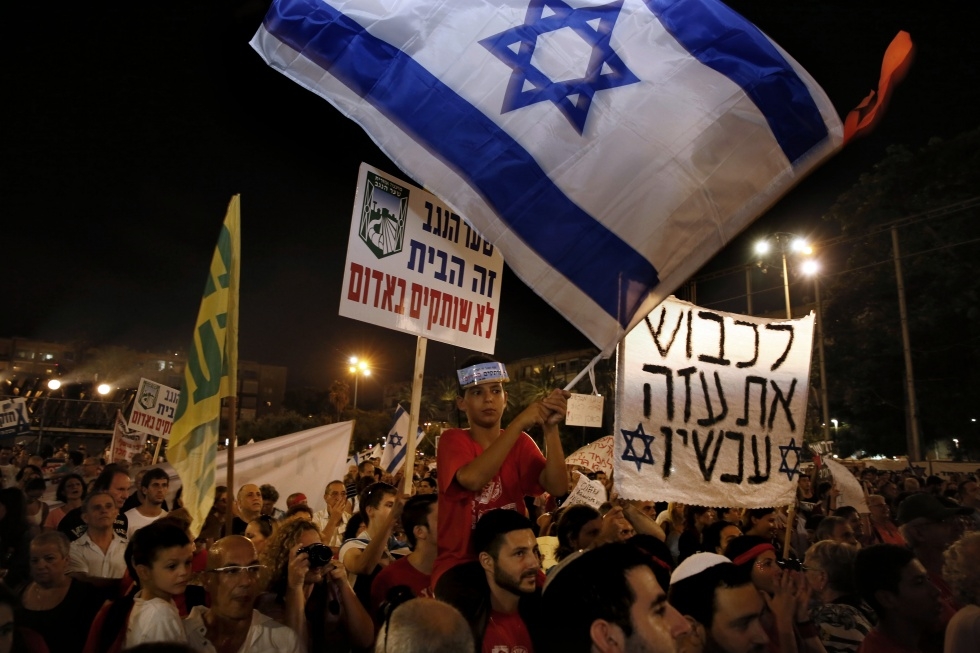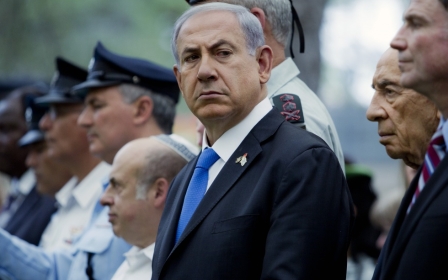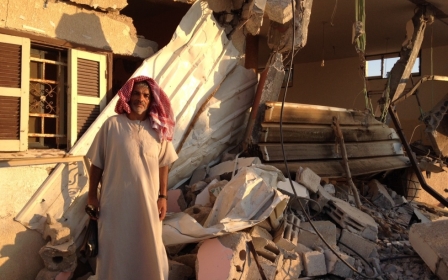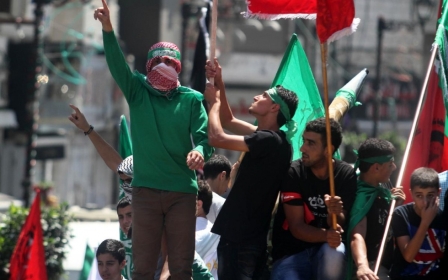Israel's spinning moral compass

The latest round of devastation in Gaza has been accompanied by another disturbing and somewhat eyebrow-raising phenomenon: the almost wall-to-wall consensus in favor of the military action among the Israeli public. A not atypical poll by the Israel Democracy Institute suggested 95% public support for the justness of the operation. This in turn is used by and puts pressure on overseas supporters of Israel - surely not all Israelis can be wrong so if you claim to care about Israel best not to second-guess or dissent from the consensus. It has probably had a knock-on effect in skewing some of the attempt to achieve ‘balanced’ coverage of a thoroughly unbalanced reality.
It is a level of public support that deserves to be much more thoroughly unpacked.
Part of the explanation lies in the realm of the generic, factors hardly unique to Israel. People rally to the flag in times of war (US public support for the Iraq invasion stood at 76% in March 2003) and certainly when they perceive themselves to be in danger. The rocket fire from Gaza has for instance had that effect. Add to this the dynamics of Israel being a small country with a small population, that has compulsory national service thereby adding to the sense of identification with Israel's military – many have been called up for reserve duty this past month. Israelis are also not the only people to have experienced failed peace efforts which then harden public positions when conflict resumes (ignoring for a moment who is to blame for that failure). Israel, as with anywhere, has its war profiteers with an interest in war boosterism – this attack on Gaza has helped the military justify inflated budgets and in Israel’s case arms manufacturers received a great fillip by being able to market their ‘battle-tested’ kit. One Israeli paper ran the headline “For Israeli arms makers, Gaza war is a cash cow”.
Israel is certainly not unusual in having either its share of manipulative leaders ready to whip up fear and call in the cavalry for political gain or its rabble rousing media more than willing to be enlisted for the cause.
Nevertheless the extremes to which both of these were taken during the current Gaza war merits a mention.
The ability to imply a (false) chain of continuity between modern day threats and collective historic trauma can be particularly tempting for the leader of a Jewish state. Israeli Prime Minister Benjamin Netanyahu revels in drawing such analogies. The way Netanyahu used the killing of three Israeli teenagers to whip up public hysteria, intentionally misleading Israelis by treating this as a prolonged kidnapping saga, was pushing the envelope even by his standards. Likewise the new depths plumbed by Israel's media are noteworthy.
Private media in Israel is increasingly under right wing ownership, while Israel's state broadcasting authority has recently been reformed and is ever more aligned with the government position. Throughout Operation Protective Edge and with few, albeit worthy exceptions, Israel's media acted as cheerleader and uncritical champion of the righteousness of Israel's cause. Israeli viewers were almost totally spared the devastating images of Gazan civilian suffering seen everywhere else. The use of reserve Generals and security establishment types as media pundits was ubiquitous.
But these explanations take us only so far. Why was the media so willing to play this role? Why was the public so receptive to the message and so eagerly mobilised? The degree of public consensus around such a devastating military assault represents the culmination of worrying longer term trends. Anyone surprised by what has happened has simply not been paying attention.
It would be comforting to conclude that a deputy speaker of parliament calling for Gazans to be placed in tent encampments and deported, a minister calling for a boycott of Arab businesses, or a governing coalition parliamentarian deeming any Palestinian mother to be a legitimate target, could all simply be dismissed as outliers. They cannot. They are part of a deeper malaise.
It was always predictable that a state would struggle to retain its democracy let alone be a tolerant society resistant to racism if that state maintained an indefinite system of control over and denial of the basic rights and freedoms of another people. The problem is exacerbated by Israel defining itself as a Jewish state without addressing how that can be consistent with inclusivity, full democracy, and equal citizenship for all. The consequences of Israel's permanent occupation and attendant dehumanisation of the Palestinians alongside the failure to resolve the internal contradictions of Israel's foundational identity provide the canvass on which this latest lurch towards unprecedented Jewish jingoism is being sketched out.
And what makes this unprecedented is that the democratic checks and balances, the levees that were once in place to prevent an antidemocratic jingoistic drip from becoming a flood have all been so very eroded. One does not have to believe in the existence of a once pristine Israel to acknowledge that the excesses of today’s chauvinist nationalism are qualitatively new.
Why is this the case?
First the political center of gravity has shifted so far in the direction of intolerance on anything to do with the Palestinians that the traditional labels of left, center, and right have become almost irrelevant. Everything is competing shades of right. Likud's last remaining liberals were culled in party primaries before the 2013 general election. Labour and centrist parties have offered no alternative and no opposition during this war, with Labour leader Yitzhak Herzog accurately described by one prominent Israeli blogger, Tal Schneider, as serving as "Netanyahu's Public Diplomacy Chief ."
Avner Inbar, director of the Israeli think tank Molad, described how “the leadership of our shriveling peace camp chose to beat the drums of war.” A pro-peace rally this past weekend in Tel Aviv was a belated realisation by some of the left of this abandonment of the public space – the Labour Party however was absent. Parliamentarians compete to introduce the most undemocratic and ethnocentric legislative measures some of which have become law.
Beyond party politics the state itself is promoting this jingoistic trend, any semblance of the state acting in a responsible fashion has been lost. There are numerous examples of educators and religious leaders employed by the state engaging in incitement and racism. Remarkably the only public figure to have been legally challenged during this wave of incitement is a Palestinian-Arab member of Knesset, Haneen Zoabi, whose words and actions are mild compared to some of her Jewish colleagues, none of whom are encumbered by police investigations. Hundreds of Palestinian citizens of Israel have been rounded up and arrested during this war.
The IDF itself is part of this trend – the officer class is increasingly populated by the religious-nationalist settler community and certain military commanders have taken to depicting their operations as a “holy war”. Even the Supreme Court, long (perhaps generously) considered the last bastion of combative democracy, can no longer be relied upon. Judges live within their societies and cannot but be influenced by societal trends. Recent years have witnessed a concerted campaign to intimidate the judiciary and to get more rightist justices appointed. The Supreme Court now has its first settler judge on the bench and during this conflict the Supreme Court upheld an Israel radio ban on broadcasting the names of the dead Palestinian children which the Israeli human rights organisation B’Tselem was planning to run.
Going back to those opinion polls demonstrating overwhelming Israeli support for the war against Gaza - those incidentally are conducted exclusively among Israel's Jewish population. It has to tell you something about the direction a society is going in when pollsters do not even bother to canvass the opinion of a minority that constitutes 20% of the citizenship.
Another research fellow at the Molad think-tank in Jerusalem, Assaf Sharon, in a powerful and insightful commentary that identifies this advance of Jewish jingoism, notes that the “social mechanisms” that “kept racism at bay have all but disintegrated.”
Of course none of this is taking place in a vacuum - Palestinian rockets and regional extremism contain a certain explanatory power in understanding Israel's lurch rightwards. But a limited one – prior to this ground incursion into Gaza, Israel was enjoying a period of relative security quiet, none of the now infamous tunnels had actually been deployed to conduct attacks on civilians, and suicide bombings were becoming a thing of the past. Compared to the region’s extremists, Hamas are people one can do not unreasonable business with (Israel's government is after all in proximity talks in Cairo with Hamas) and many regional leaders are now more accepting of Israel.
It seems though that Israelis are inhabiting a quite different space. Israel is a society increasingly turning in on itself in what Molad researcher Assaf Sharon has called an "internal moral siege".
Which in turn creates a dilemma for allies and friends of Israel, not least in the US and Europe. Israeli officials relentlessly chide and abuse the Obama administration and hurl catch all accusations of anti-Semitism at Europeans (the rise in anti-Semitism is real, the official Israeli attempt to see anti-Semitism behind most all anti-Israel campaigning is cynical, manipulative and unhelpful). Yet it is becoming evermore transparent that continuing to treat Israel with indulgence and impunity is not going to improve matters. Indeed what might be hardest of all for Israel's friends in the west to accept is that the country and its public are in need of a sharp wake-up call. Nobody volunteering to curtail Israel's impunity should expect a warm welcome - but careering further down this current path certainly does not bode well for Israel.
- Daniel Levy is director of the Middle East and North Africa Program at the European Council on Foreign Relations and a senior research fellow at the New America Foundation. He was previously an official negotiator for the Israeli government in peace talks with the Palestinians under Prime Ministers Rabin and Barak, and served as the lead Israeli drafter of the Geneva Initiative.
The views expressed in this article belong to the author and do not necessarily reflect the editorial policy of Middle East Eye.
Photo credit: Israelis gather during a protest calling on the government and the army to end Palestinian rocket attacks from Gaza once and for all on 14 August (AFP)
New MEE newsletter: Jerusalem Dispatch
Sign up to get the latest insights and analysis on Israel-Palestine, alongside Turkey Unpacked and other MEE newsletters
Middle East Eye delivers independent and unrivalled coverage and analysis of the Middle East, North Africa and beyond. To learn more about republishing this content and the associated fees, please fill out this form. More about MEE can be found here.





